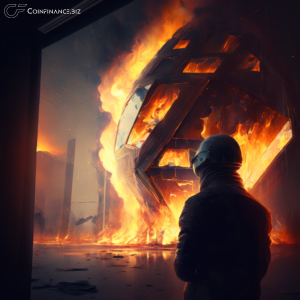In the world of NFTs, accidents can be costly. Recently, the NFT community was stunned when collector Brandon Riley accidentally burned a CryptoPunk NFT worth $200,000 by sending it to a burn address. This incident has sparked a debate among NFT collectors about the risks of borrowing against NFTs and the need for more education around wrapping techniques.
CryptoPunks: A Cult Following in the NFT Market
CryptoPunks are among the most popular NFTs in the market, created by Larva Labs as unique 8-bit pixel art characters stored on the Ethereum blockchain. Each CryptoPunk has its own distinct traits, making them highly sought after by collectors. Riley had purchased the coveted CryptoPunk #685 on March 13, paying 77 ETH in the hopes of holding onto it for the long term.
The Wrapping Technique
As a seasoned investor, Riley knew the potential of NFTs and had invested heavily in them in the past. He also knew the importance of procuring new NFTs before the crypto markets took off, especially during a bull market. In an attempt to maximize his investment, Riley decided to borrow some money against CryptoPunk #685 using the wrapping technique.
Wrapping involves creating a wrapped token that represents an NFT and can be used as collateral for loans. This technique is popular among NFT collectors who want to borrow against their holdings without selling them. However, the process can be confusing for beginners, and Riley made a fatal error by sending the NFT to a burn address.
The Fatal Error
A burn address is a special type of Ethereum address that has no private key and can’t be accessed by anyone. Any crypto asset sent to a burn address is effectively destroyed, and the asset cannot be recovered under any circumstances. In Riley’s case, the CryptoPunk #685 was sent to a burn address by mistake, permanently deleting it from circulation.

The Need for Greater Awareness
The incident has highlighted the risks of borrowing against NFTs and the need for greater awareness around wrapping techniques. While NFTs have the potential to be highly lucrative investments, it’s important for collectors to educate themselves on the intricacies of the market and the various techniques used to maximize their returns.
Conclusion
The accidental burning of CryptoPunk #685 by NFT collector Brandon Riley serves as a cautionary tale for other NFT collectors who may be considering borrowing against their assets. It’s essential to understand the risks involved in wrapping and other NFT borrowing techniques before taking any actions. As the NFT market continues to grow, it’s crucial for collectors to stay informed and educated to avoid costly mistakes like Riley’s.




